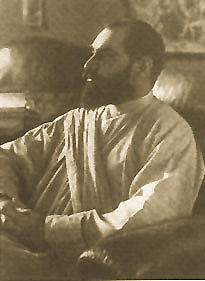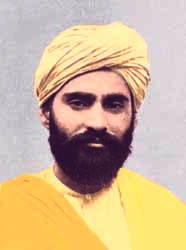One day when joyfully he burned Holy Bible in presence of his father, his thirst for truth overpowered his devilish mental sickness. Three days after the incidence, he woke up at 3 A.M. and prayed, "Oh God, if you do exist, show me the right way or I will kill myself". He decided to die under the running train that passed at 4 A. M everyday, behind his house. He thought that he would find inner peace in his future birth. He once again prayed with a determination to move to the railway track. All of a sudden he saw a bright light in his room. He saw Jesus' in the radiance and heard His voice, “I am the way and the truth and the life. No one comes to the Father except through me”.
It was an experience similar to St Paul. St Paul had heard His voice “Saul, Saul, why do you persecute me? It is hard for you to kick against gods”. Jesus commanded Saul “ I am sending you to them, do open their eyes and turn them from darkness to light, and from Satan to God, so that they may receive forgiveness of their sins and a place among those who are sanctified by faith in Me”. It changed his life altogether and Saul (St Paul) turned from persecutor to discipleship.
Similarly, Jesus changed his life. Sunder turned to be disciple and saved so many lives, preached the Word of God throughout the world. He realized that Jesus was living God forever. Sunder fell on his knees before Him and experienced an astonishing peace that he had never felt before. The vision disappeared, but peace and joy remained within him throughout.
This happening transformed his life. On his birthday in year 1905, he took baptism in an English Church in Simla. It was against the wishes of his family but Sunder became disciple of Christ. His father renounced him and his family ostracized him. The day he left his house, his food was heavily poisoned to kill but God saved him.
On October 16 1905, in a yellow robe, barefooted and without provisions, he resumed his nomadic life. He preached the Holy Gospel from village to village. He dedicated his life to the Lord, abandoned all possession, maintained celibacy and lived on charity. He was convinced that only in that dress he could reach and preach the Gospel in India.
In 1906, he went to Tibet for the first time. That country attracted him, primarily because of the great challenges against evangelism. He had expected very strong opposition and persecution in that region. On high snow clad Himalayan peaks, he preached Gospel and faced persecution in His name.
 "On his way to Tibet, he met Mr. Stoker, an American missionary who also wore a yellow robe. Very often, they spent the nights together under trees or in the mountain caves at an altitude of 5000 meters above sea level. Most of the time, they slept without food and enough cloths. Happily they endured all the hardships for the sake of preaching the Gospel. Once Sunder fell sick, Mr. Stoker managed their stay in a house of one European. Inspired by Sunder’s faith in God and his sincere love for people, the host confessed and repented for his sins, surrendered himself to the Lord.
"On his way to Tibet, he met Mr. Stoker, an American missionary who also wore a yellow robe. Very often, they spent the nights together under trees or in the mountain caves at an altitude of 5000 meters above sea level. Most of the time, they slept without food and enough cloths. Happily they endured all the hardships for the sake of preaching the Gospel. Once Sunder fell sick, Mr. Stoker managed their stay in a house of one European. Inspired by Sunder’s faith in God and his sincere love for people, the host confessed and repented for his sins, surrendered himself to the Lord.
For theological knowledge, Sadhu Sunder Singh joined ‘St. John School of Theology’ in Lahore. He studied there for two years and later resumed his journey to preach Gospel.
As expressed by him, once, while sitting on the treetop, he was singing the hymn on his love for Jesus. One man pulled him down and knocked him to the ground. He silently got up and prayed for the hostile person. He told him, how Jesus loved the sinners. Jesus died as a sacrifice to redeem the sinners. He told, Lord says, "Love your enemies and pray for those who persecute you". (Matthew 5:44) The said person with his companion repented and turned to Christ.
Once while he was in Tibet, four robbers trapped him in the middle of jungle. One of them brandished a sword. He meekly bowed his head thinking that it was end of his life. This attitude was a big surprise for them. Since he was penniless, they took his blanket and let him go. Surprisingly one of the robbers called him back and curiously asked his name. Sunder introduced himself, opened his Bible and started telling him the story of the rich man and Lazarus the poor. One of the robber said that the end of the rich man's life was unpleasant so what would happen in their case. Sunder preached to him the Gospel and God's forgiveness. The robber took Sunder to his home and repented.
In 1912, he initiated seclusion and fasting for 40 days. He failed to complete his long fast because of his ill health. However the experience strengthened his spirit.
He often suffered persecution but was always miraculously delivered by the Lord. In 1914, Sunder preached in Tibet, a country with very strong root of Buddhism. In the town of Rasa, a local Lama, sentenced him to death for spreading a foreign religion in Tibet. He was thrown into a drenched well covered with a lid on the top and locked inside. The punishment was beyond his tolerance as there were corpses of executed murderers, snakes, rats and other rattling animals beside him in the well. He was without food, drink and clothes for 2 days. Third day he saw a rope thrown from the top and he was asked to catch the rope. He caught the rope and some one pulled him out. He wanted to thank the helper, but to his surprise no one was there to receive his gratitude.
Again he was recaptured and taken to the Lama. It was an utter surprise to Lama as the only key of the lock on the well he had in his personal custody. Lama asked him, how he came out? Sunder said, “you had put me to die but my Lord is the Lord of life”. They realized that Sunder was under the protection of a very powerful God so fearfully asked him to leave Tibet. Lama managed to ban his entry into Tibet in future.
In 1918, Sunder visited Madras where thousands of people gathered to listen to his preaching. He focused his preaching on Jesus Christ as the only redeemer. He testified, “His presence always brings astonishing peace to me”. He said that in every situation, Jesus was with him. While in prison, He was there with me. He transformed the jail into a heaven and the punishment became blessings.
He said, “There are Christians, who do not experience His glorious presence as something real, because Jesus is only in their minds not in their hearts. Only who surrenders his heart to Him, he finds Him."
While preaching, Sunder often used parables like Jesus. He once said, "One day, I was taking rest after a long journey. Suddenly a sparrow came towards me, as it was helpless to bear the strong wind blowing. An eagle dived to catch the panicky bird. Sparrow flew into my lap to save its life. By choice, it would not normally happen. However, the little bird was seeking for a refuge from a great danger. Likewise, the violent winds of sufferings blow us into the Lord's protective hands."
He preached in London (Great Britain) and in California (United States of America). In1918-1919, he visited Malaysia, Japan and China. In1920-1922 he went to Western Europe, Australia and Israel. He preached in Jerusalem, Lima, Berlin and Amsterdam. Sunder remained modest despite his fame. His attitude made his father repent at the later stage. Sunder never thought of himself but only longed to follow Jesus, repaid evil with kindness and won over his enemies by love. This attitude often caused his enemies to feel ashamed of their evil actions. Once, he was preaching in public, a fanatic (non Christian) punched his right cheek. Calmly, Sunder turned his left cheek towards him. The attacker left immediately but sought forgiveness for his sin he had committed.
Once Sunder told some harvesters, the parable of the weeds. They became annoyed and one of them stoned at Sundae’s head. The stone thrower was struck by severe headache and lied down on the ground. Sunder took his sickle worked for him in the field. Harvesters soon became friendly to him and invited sunder to their home. He opened their hearts for Gospel. The next day when Sunder had left them, they noticed that the harvest was much more than normal.
Sunder visited Tibet again in year 1929. He never returned back, perhaps his assignment on earth was over. "For whoever wants to save his own life will lose it; but whoever loses his life for me and for the Gospel will save it." (Mark 8:35)
To read more about him, his life and teachings, please click .here.
 nterested in Christianity but turned to be anti-Christ. He believed that Jesus had taught completely wrong faith. He used to tear Holy Bible apart and burn it. During his school days he often enjoyed stoning Christian Missionaries and encouraged others to join him in his nasty activities.
nterested in Christianity but turned to be anti-Christ. He believed that Jesus had taught completely wrong faith. He used to tear Holy Bible apart and burn it. During his school days he often enjoyed stoning Christian Missionaries and encouraged others to join him in his nasty activities.